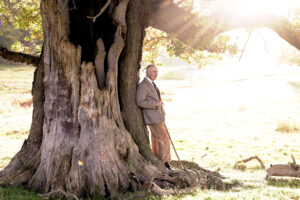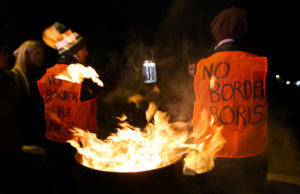In his short story A Clean, Well-Lighted Place, Ernest Hemingway describes a deaf old man who likes to sit in the terrace of his favourite cafe late into the evening drinking brandy, much to the frustration of a young waiter who just wants to go home. “He can buy a bottle and drink at home,” the waiter snaps to his colleague, refusing to give the old man a final top up. “It is not the same,” the older waiter replies. “This is a clean and pleasant café. It is well-lighted.”
This exchange captures an atmospheric truth about life: sometimes you come across certain places, and even certain countries, that are clean and well-lighted. They are pleasant and harmonious. They work. It is not always easy to say why, but like the deaf old man you feel that they do. They have a sense of national cohesion; of gentle order and prosperity. “Also, now, there are shadows of the leaves,” the older waiter tries to explain to his sceptical colleague. The point is, it is atmospheric.
What strikes me today is how impossible it is to feel this about the United States. As Robin Williams joked, Canada is like a nice loft apartment, but America is the party raging underneath. That party, though, is turning sour; something is rotten in the state of America. Even Williams later changed his analogy. Canada was still a nice apartment, but America had turned into the nightmare meth lab below.
The news that Donald Trump will be indicted for allegedly paying hush money to a porn star only adds to the mounting atmosphere of dysfunction. Not so much because of the indictment itself but because of the sense of foreboding that comes with it. On the one hand, it shows that no figure is above the law; proof, even, that America remains a great republic. Why shouldn’t Trump be indicted, after all? If he broke the law, he broke the law. There are plenty of other presidents and prime ministers outside the US who have found themselves prosecuted for criminal behaviour without it endangering national cohesion. In France, both Nicolas Sarkozy and Jacques Chirac were prosecuted after leaving office. In the US, Bill Clinton avoided such a fate after striking a plea bargain on his last day in office.
Trump’s indictment, though, plays into existing fears about the future of the Republic: of democratic norms no longer holding; taboos being broken; dangerous precedents being set; even of a late-stage imperial decline becoming entrenched. Columnists wonder whether we are witnessing the kind of constitutional unwinding that doomed the Roman republic when the state became too big for its constitution. Perhaps this is the moment American presidents begin fearing for their liberty after office and start behaving as such. After all, it doesn’t require an overly tragic mind to wonder what lessons Trump will take from this should he somehow take back the presidency. And yet what is the grand jury in New York supposed to do if Trump has broken the law? Ignore it? Trump, as ever, is both a cause and a symptom of America’s great national crisis.
Look around and the signs of dysfunction are everywhere. Just as the scale of the country’s wealth and power are hard to comprehend for those of us outside the imperial homeland, so too is the scale of its violent disorder and dysfunction. Take homelessness. In Los Angeles today, there are approximately 42,000 people sleeping rough at the moment — and some 113,000 in California overall. In the whole of England, by contrast, there are around 3,000.
Or consider the scale of violence. Across the whole of the US, around seven people are murdered for every 100,000. This compares to around one in 100,000 in the UK, France and Germany — and half that number in many smaller countries in Europe. But even this masks the extraordinary ferocity of murderousness that is gripping some of America’s cities. In St Louis, the murder rate is 64 per 100,000. In parts of Chicago, it has reached almost 150 per 100,000. Such violent criminality is almost a social sickness. During the bloodiest year of the Troubles in Northern Ireland,1972, there were 31 deaths per 100,000.
Examples of social breakdown are everywhere. There are the 131 mass shootings in America this year alone, on top of the 647 last year and 690 before that — a form of nihilistic terrorism that has been normalised to the point of acceptance. The opioid crisis in the States is also of a different order to anywhere else. More than 58,000 people died from fentanyl overdoses in 2020, compared with 97 in the EU.
Life expectancy, meanwhile, has collapsed in staggering fashion, in a way that is completely out of line with any other advanced country, down from 78.8 in 2019 to 76 today. This is not simply a case of poor Americans dragging down the overall figure either; all groups in America die younger than their counterparts in similar countries, whether old or young, rich or poor. And American children, for example, are less likely to live to age five than children in Europe. The banality of such failure is difficult to grasp, particularly for anyone who has been to the US and witnessed the extravagance of its suburban prosperity.
It is this tension, between suburban wealth and social breakdown, which catches you off guard when it appears on TV shows and movies. Every American sitcom or box set has some passing reference to prescription drug abuse. It is there in Modern Family; a small joke about popping a Xanax in with the evening glass of wine. And it is there in your face in White Lotus, with the American elite living secretly miserable lives, their children loaded with all sorts of drugs: uppers and downers, edibles and prescription pills.
This is part of the great paradox of our American order. Even as the US grapples with its own social and political dysfunction, it dominates our world culturally, economically and militarily. Right now, the United States is attempting to maintain its global hegemony by protecting both the European and East Asian security orders at the same time. To do so, it must hold at bay both Russia in Ukraine and China in Taiwan. It is easy to forget the scale of this challenge because we have accepted it as normal. And yet it is not. America is the most powerful nation state in history, not the new Britain but the new Rome.
Robert Kaplan argues in The Tragic Mind that America has entered a phase of its life in which it has become so big that it no longer controls its destiny. As a mere republic before the Second World War, it enjoyed a certain freedom. “Democracies and republics,” he writes, “give tangible expression to the idea of human intervention.” In democracies, we believe that the actions of individuals matter, that we have agency over our lives and our world, and are not buffeted by grand impersonal forces or fate. But once democracies become empires, “so many new and vast historical forces come into play that the idea of human agency weakens, and fate again edges in”.
This, says Kaplan, is the American tragedy today. “While the world might be fixable here and there, as America strode into a larger canvas in places like Afghanistan and Iraq, that very same world proved more and more intractable… suddenly Americans learned that their power to change the world was circumscribed.” For Kaplan, who supported the Iraq war but came to bitterly regret his misjudgement, America then gave up any credibility to lecture the world by electing Trump. “Trump’s effect on our domestic politics laid bare the American system’s tenuousness,” he writes. In despair, Kaplan now wonders whether America’s very system of government is a productmatter of contingency, the creation of 18th-century events and ideas but one destined to disappear like every other empire. “Rather than the cohesion afforded by World War II and its Cold War extension, we now seemed headed into a messy, dangerous world, both foreign and domestic.” The cohesion has gone, impossible to measure, but there in the atmosphere of the Republic.
But, again, the paradox. Today, despite the chaos, the United States is not only maintaining its global power and wealth, but in many ways has deepened its dominance. Its economy is pulling away from Europe, while much of the democratic Western world is clinging ever more tightly to the legs of its big brother protector. Culturally, too, America remains the source of almost everything which defines our world, from its fashions and music, to its movies and even its political ideas. The truth is, even as we look on in alarm, we dress like Americans and think like them too. The progressive Left rails against the American imperial order only to copy almost all of the battle cries and slogans which burst out of the imperial centre.
In the 16th century, the Florentine philosopher and statesman Francesco Guicciardini warned that the process of imperial decline takes far longer than is often imagined. “If you see a city beginning to decline, a government changing, a new empire expanding, or any such phenomenon — and these things are sometimes quite clearly visible to us — be careful not to misjudge the time they will take.” This is the situation we face today. America’s problems are clearly visible, yet so too is its enduring strength.
Guicciardini went on to warn of the dangers of underestimating a declining empire. “To be mistaken in these matters can be very harmful to you,” he warned. “Be very careful, for it is a step on which people often stumble.” This is the lesson that Vladimir Putin is learning today. He declared the American Century over and then found himself bogged down in hell in Ukraine, matched by a country a fraction of its size without a single American boot on the ground.
In Hemingway’s A Clean, Well-Lighted Place, the deaf old man who liked to drink late on the terrace of his favourite café did so because he had lost his wife and was lonely. “Last week he tried to commit suicide,” the older waiter explained to his impatient colleague. “He was in despair.” The other waiter asked what about. “Nothing,” he replied. “How do you know it was nothing?” “He has plenty of money.”
This is America today. It is rich, but it is clearly in despair. It is indicting former presidents who may still go on to be future presidents. It is angry and divided, scarred by social breakdown and contagious outbreaks of violence. And yet its very chaos is still part of what makes it great, its riotous public clinging to the belief that they are not bound by fate — but the actions of individuals.
Disclaimer
Some of the posts we share are controversial and we do not necessarily agree with them in the whole extend. Sometimes we agree with the content or part of it but we do not agree with the narration or language. Nevertheless we find them somehow interesting, valuable and/or informative or we share them, because we strongly believe in freedom of speech, free press and journalism. We strongly encourage you to have a critical approach to all the content, do your own research and analysis to build your own opinion.
We would be glad to have your feedback.
Source: UnHerd Read the original article here: https://unherd.com/




